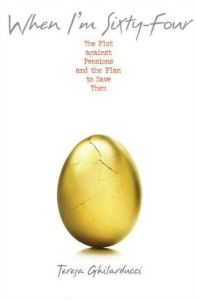Join getAbstract to access the summary!

Join getAbstract to access the summary!
Teresa Ghilarducci
When I'm Sixty-Four
The Plot against Pensions and the Plan to Save Them
Princeton UP, 2008
What's inside?
Bold plan to preserve retirement: Will you be comfy in your golden years…or just work forever as pension plans fade?
Recommendation
For many Americans, the dream of a safe, secure retirement has become a cruel joke. Elderly people without pensions find themselves trying to squeeze by on Social Security as they work part time for minimum wage serving hamburgers or greeting customers at discount stores. Some have money saved, but the overall U.S. savings rate is way down. For most workers, reliable pensions are becoming a thing of the past, just as costs are rising. Pension expert Teresa Ghilarducci explains that Social Security is under threat, even though many retirees have no other source of income. What is to be done? At this point, Ghilarducci stops analyzing and starts recommending. Americans need a bold, new government program offering “Guaranteed Retirement Accounts” (GRAs). She asserts that – given a burst of radical change – this idea can provide safe, secure incomes for U.S. elders. getAbstract finds that even though some readers might dispute her political conclusions and the fine points of her alternative plan, Ghilarducci cares passionately about retirement policy and provokes a meaningful conversation for those who hope for a dignified retirement.
Summary
About the Author
Teresa Ghilarducci is director of the Schwartz Center for Economic Policy Analysis at The New School for Social Research. She is an expert on retirement reform.


















Comment on this summary